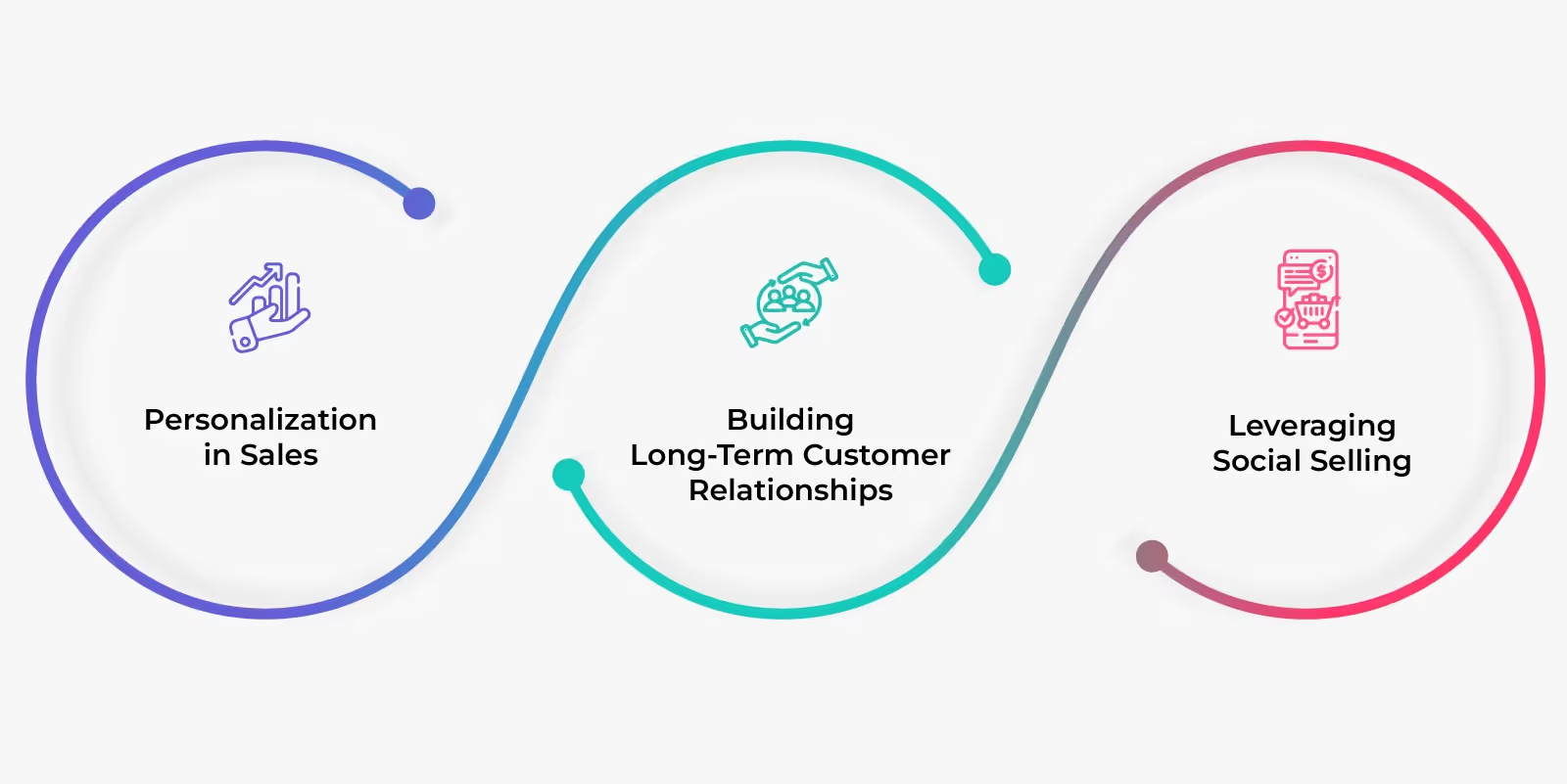
Blog
Advantages and Disadvantages of Sales Concepts
October 20, 2023


Key Insights
It's not about having the right opportunities. It's about handling the opportunities right.-
MARK HUNTER
Success in sales comes with grabbing the opportunity at the right time. It most often happens that such opportunities not just come to you but have to be created through your efforts.
That is what marketing does to improve sales.
It creates that ambiance where customers become aware of your brand or product, gets attracted to the features and benefits, and finally, when sales approach it is easy to convert them.
So what are these concepts and strategies that help boost sales?
In this article, we will walk you through sales concepts, the advantages and disadvantages of using sales concepts, and the difference between marketing and sales concepts.
So scroll down for more.
What is a sales concept?
Sales concept refers to marketing strategies applied to increase sales and revenue by making customers buy what they necessarily need.
A sales concept example will be the great discount sale that happens every year. For the shop owner, it might be a stock clearance where they are trying to get rid of the overstocked products before the new set comes in. Seeing the discount rates, customers will be lured to buy the product or more even if they don't need it.
Sales concept sells not based on one's requirement but by putting selling efforts that tap the customer interest, curiosity, or the thought of making a profit.
Now a sales strategy that approaches customers by selling products and services whether they want to or not will have many advantages and disadvantages.
Advantages of using a sales concept
The above-mentioned sales concept example demonstrates a win-win situation where the sales team's responsibilities play a crucial role in efficiently connecting the owner with customers, allowing the owner to profit from old stock while ensuring customers receive high-quality products at a more affordable rate.
Now, let's look at the other advantages of applying sales concept strategies to selling. By leveraging tools like the Kennect sales mix calculator, businesses can strategically plan and optimize their sales approaches for greater efficiency and profitability.

Attract Wider Customers
When companies initiate selling strategies, a wider customer base will be attracted to them. The offers, discounts, and benefits will make them believe that the product is a good deal or that it is a necessity for them. Increasing the customer base will hence help improve the custom reach and base for future sales as well.
Improves Sales
In the era of sales transformation, brands not only focus on timing and seasonal trends but also leverage data-driven insights, customer behavior analysis, and innovative marketing techniques to create a more dynamic and customer-centric approach, resulting in sustained growth of sales and revenue throughout the year.
Enhances Demand
Selling concepts try to enhance demand for a product or service that is not necessarily in demand for the customer. When you come across a product through multiple channels like a particular dress or gadget, even if you might not need it you will consider buying it.
For further reading, check Why Sales Approaches Are the Key to Your Business Success.
Disadvantages of using a sales concept
Through sales concepts in marketing, companies are luring customers to buy. Surely, this will be followed by disadvantages as well.
Ignore Customer Needs
Selling concepts are strategies that indirectly make consumers buy even if they do not need it. This marketing strategy of not considering the customer requirement will not always bring a positive outcome.
Short-term sales
Selling concepts, with their inherent short-term impact in catching customer attention, also translate to ephemeral sales and revenue. In contrast, sales as a service examples extend beyond mere transactions, fostering lasting relationships. While traditional selling concepts may create a temporary demand that eventually wanes, sales as a service models focus on continuous value delivery, ensuring sustained customer interest and engagement over time.

Inconsistent Demand
Selling concepts only try to sell without taking into consideration much of the customer's needs, requirements, or demands. Hence, the product or service will always have an inconsistent demand rate. People will get bored of the ads or other selling strategies. Hence, companies must come up with better and more innovative ideas to ensure consistent demand.
Sales concept in marketing is a strategy that is regularly put into use as it helps achieve the selling objectives within a short period of time.
Sales concept in marketing is a strategy that is regularly put into use as it helps achieve the selling objectives within a short period of time. Read how sales associates vs. sales executive differ in their sales approach. Check How do Sales Reps and Sales Associates Differ in Skillsets, Responsibilities, and Rewards?
Difference between the marketing concept and selling concept
Marketing concepts and selling concepts are very different in their approach and style of selling.
- Selling concept is short-term selling while marketing concepts have a long-term selling approach.
- Selling concepts are not bothered about customer needs or feedback, on the other hand, marketing concepts are based on customer requirements and feedback.
- While the selling concept is focused on just selling a high number of products, marketing concepts look for profit-making through customer satisfaction. B2B sales vs B2C sales illustrate how these concepts vary in their application across different business models. Selling concepts in B2B sales may prioritize building long-term relationships, while B2C sales might employ strategies emphasizing immediate transactional success.
- Selling concept focuses on making a profit by just selling while the marketing concept makes money by making products by understanding the customer requirements.
- Selling concept sells by projecting the product or services while marketing concepts project the benefits it will have for the customer.
- Online shopping, door to door selling make use of selling concepts while the automobile industry and electronic gadgets use marketing concepts for selling their products.
While selling concepts have their advantages and disadvantages, judicious use of the technique in your business operations at regular intervals will yield profit and growth for the company.
For further reading, check The Ultimate Guide To Successful B2B SaaS Marketing Strategies.
Integrating Sales Concepts with Modern Techniques

Blending classic sales concepts with modern techniques creates a powerful recipe for success!
Sales and digital marketing are a match made in sales heaven. Here's how they work together:
#1 Digital marketing attracts qualified leads:
Think social media, targeted ads, and informative blog posts. These tools grab potential customers' attention and bring them to your sales team's doorstep (or inbox).
#2 Data Makes Sales Decisions SMARTER
Ever wonder why online ads seem to follow you around the internet? That's the power of data analytics! By tracking website visits, email clicks, and social media engagement, you can see exactly what kind of content resonates with your audience.
Data tells you how well your sales funnel is working. Are leads dropping off at a certain stage? Use this info to improve your sales strategy and plug any leaks.
#3 Utilizing CRM Tools to Enhance Sales Performance
It keeps track of all your customer interactions – emails, calls, notes, the whole shebang. This makes it easier for your team to:
No more lost leads or forgotten follow-ups. Everything is neatly organized in one place with CRM.
Sales reps can share notes and insights on customer interactions, ensuring everyone is on the same page.
Advanced Strategies
We've covered the basics of integrating classic sales with modern techniques. Now, let's dive into some advanced strategies to take your sales game to the next level:

1. Personalization in Sales:
- Know your audience: Don't treat everyone the same. Dig deeper than demographics - understand their specific needs and challenges.
- Be genuine: Personalization shouldn't feel robotic. Make it natural, and show you care about each customer as an individual.
2. Building Long-Term Customer Relationships:
- Trusted advisor, not just a seller: Offer valuable advice and resources that help your customers succeed, not just push products.
- Listen actively: Pay close attention to their needs and concerns. Show them you're genuinely interested.
3. Leveraging Social Selling:
- Become an industry thought leader: Share valuable content, participate in discussions, and establish yourself as an expert on social media.
- Connect, don't just sell: Build relationships on platforms like LinkedIn and Twitter. Show them you're more than just a salesperson.
- Authentic engagement is key: Focus on providing value and genuine connections, not bombarding people with sales pitches.
Common Mistakes to Avoid in Sales
Even the smoothest salesperson can make missteps. Here are some common mistakes to watch out for:

#1 Talking Too Much, Listening Too Little
People want to feel heard and understood. Instead of launching into your pitch, ask questions to discover their needs and challenges.
#2 Focusing on Features, Not Benefits
Features are technical details. Benefits are how those features improve the customer's life. Focus on how your product or service solves their problems and makes things better.
#3 Price Point vs. Value Proposition:
Price is just a number. Value is what the customer gets for that number. Don't lead with price. Explain the value your product offers, then the price will seem more reasonable.
#4 The "Hard Sell" Approach
The hard sell is all about pressure and convincing someone to buy something they might not even need. People see through that these days. Focus on building trust and a genuine connection, and let the value of your product do the selling.
#5 Failing to Handle Objections
Everyone has concerns. Objections are a chance to clarify your value proposition and address the customer's specific worries. Don't get defensive. Listen carefully, and show how your product overcomes those obstacles.
#6 Not Knowing Your Customer
Do your research! Understand the customer's industry, their typical challenges, and their buying process. Tailor your pitch to their specific needs.
Conclusion
Selling is an art.
To achieve this, a salesperson's communication and confidence must be refined through continuous salesforce evaluation process and sales performance analysis.
This helps them gain insights to tailor their approach to emphasize the product's benefits and indispensable value to potential customers.
These efforts result in successful persuasion and increased sales.
Incorporating a selling strategy is dependent on various types of selling techniques. The month of the year, the product type, its features, demand, and many more will influence whether it will be bought by the customer or not.
But a great deal is determined by the salesforce that sells the product. To ensure consistent selling, the salesperson must be competent and motivated. And the most effective way to keep your salesforce is through incentive compensation.
Kennect builds, runs, and automates your incentive compensation plans to create transparency and achieve operational efficiency. For more information, Book A Demo Now!
ReKennect : Stay ahead of the curve!
Subscribe to our bi-weekly newsletter packed with latest trends and insights on incentives.
Thank you! Your submission has been received!
Oops! Something went wrong while submitting the form.
Your data is in safe hands. Check out our Privacy policy for more info















